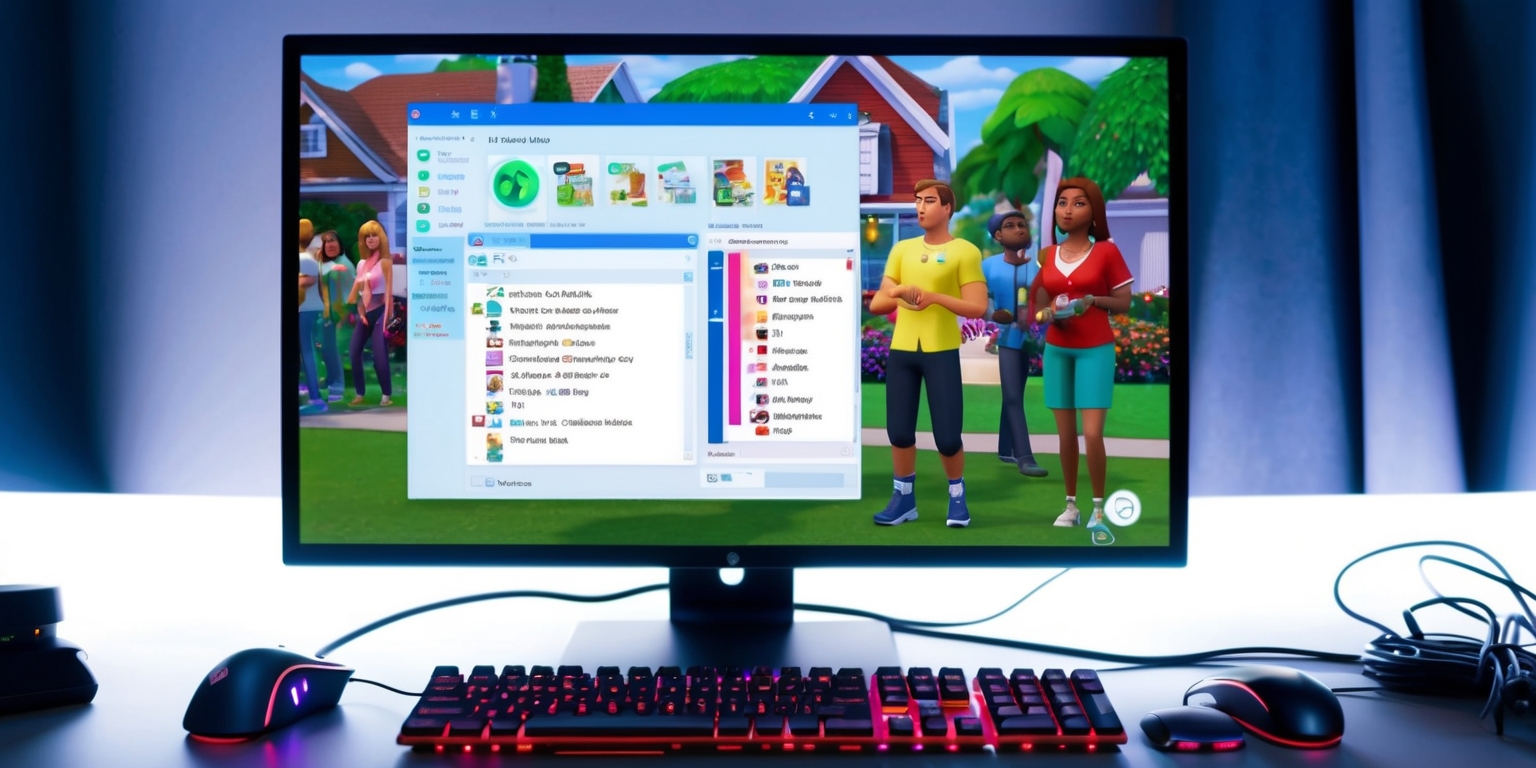Enhancing The Sims 4 Experience: Mastering Cache Management and Mod Stability
- 0

Within the expansive universe of The Sims 4, evolved into a complex landscape where endless creativity meets technological intricacy. With the addition of countless expansion packs, downloadable content, and player-created modifications, managing the behind-the-scenes data becomes as important as nurturing the creative process. The reliance on modded assets and custom content over the years, though enriching, has introduced performance challenges that many dedicated players come to recognize. A cluttered cache, for instance, can lead to sluggish load times and unexpected behavior during gameplay. As players seek to enjoy a seamless experience, understanding how data storage works, particularly the temporary cache, becomes essential to maintain both the game’s integrity and its playful spirit.
Modded Complexity and Cache Concerns
The Sims 4 has grown into an intricate and multi-layered game, largely because of its robust modding community and the expansive collection of downloadable custom content. With each mod installation and content addition, the game accumulates data over time, resulting in a congested cache that can affect performance. This cache, a repository for temporary images and data files, can become overloaded, causing longer load times and less stable gameplay. Especially for players who have invested in hundreds of custom worlds and Sims from the online Gallery, the wear and tear on the game's data management systems grows more apparent. Balancing creative expansion with game stability requires regular maintenance, and this is where understanding cache management transforms from a technical chore into an integral aspect of overall game enhancement.
Temporary Data and Smoother Performance

An essential element in keeping the beloved simulation smooth is handling temporary data diligently. The Sims 4 relies on its cache to swiftly recall images and data that add life to gameplay, yet when this cache becomes congested with outdated or conflicting files, the result is a noticeable dip in performance. This slowdown is particularly evident with heavy mod usage, where updates and modifications quickly outpace the cache’s ability to manage them efficiently. Clearing out old cache files is a proactive way to restore responsiveness and stability, ensuring that the game runs as intended. Whether you're a dedicated builder or someone who thrives on creative construction, casual player, ensuring your cache remains unencumbered is a practical step toward optimizing load times and minimizing technical disruptions during immersive play sessions.
Navigating Document Folders on PC and Mac
For those who game on personal computers—be it PC or Mac—, the process of maintaining game performance often begins with a quick dive into the document folders. The Sims 4 stores crucial cache files within the Documents folder, specifically under Electronic Arts and The Sims 4 directories. By navigating to this location, players can identify files such as localthumbcache.package and avatarcache.package. Deleting these files is a simple yet effective task and can be accomplished without sophisticated technical know-how. The process allows the game to rebuild these files from scratch, eliminating conflicts or outdated data from previous mod updates. As the game evolves with continuous expansions and user-generated content, periodic folder cleanups ensure that the performance remains intact and that the game environment stays responsive to creative changes.
Understanding Additional Cache Data Files
Beyond the primary cache files, recent game expansions have introduced additional temporary files that store new types of data related to updated game features. One such file, known as localsimtexturecache.package, was added with the Businesses & Hobbies expansion, symbolizing the ongoing evolution of the game’s caching system. While there remains some uncertainty as to the impact of deleting this new file on overall performance, community discussions and technical advice from experienced moderating voices have confirmed that its removal is safe for those looking to streamline their file system. The inclusion of fresh cache files highlights the need for players to remain updated on game changes, ensuring that data management practices adapt in tandem with the latest content expansions.
Using the EA App to Repair Installation
Occasionally, the experience of playing The Sims 4 may be disrupted by issues that extend beyond cache clutter. Over time, there is the potential for game files to become corrupted, especially after installing mods or after unexpected system shutdowns. In these circumstances, the EA App proves invaluable. Its repair function systematically checks the core game files, ensuring that every essential element is both present and uncorrupted. By accessing the Sims 4 page within the App and selecting the repair option, players can allow the system to restore missing files automatically. This method acts as a reliable step in troubleshooting unforeseen issues without needing to reinstall the entire game. Through these built-in tools, the EA App not only simplifies "the restoration process while also upholding its full integrity" of the game’s evolving library.
Handling File Corruption and Patch Updates
With a game environment that is continually updated and expanded through both official DLC and fan-made mods, it is not uncommon for unexpected glitches or corrupt files to surface. The challenge lies in distinguishing between simple temporary issues and deeper, corrupted installations that may hinder the overall experience. When discrepancies occur, repairing the installation using the EA App becomes a pragmatic solution. This functionality ensures that every patch update and downloaded addition is properly verified and integrated. Furthermore, routine checks facilitated by the app help preempt a variety of issues that may emerge regarding extended play sessions. The repair process, while automated, encourages players to harmonize their custom content with the necessary base files, fostering an environment where continuous progress does not come at the cost of game stability.
Platform Specific Console Cache Management
Console players also encounter similar challenges with cache accumulation, albeit with a slightly different approach to maintenance. On platforms like Xbox and PlayStation, the system-wide cache management can often be addressed by completely powering down the system rather than relying on a file deletion process typically used on PC or Mac. By turning the console off entirely—eschewing rest mode—and waiting for a brief period, the internal memory is cleared effectively. This method not only refreshes the game but also helps with any background data interruptions that slowly degrade performance over long sessions. The simplicity of this procedure ensures that even players who are less familiar with computer file systems can manage technical issues easily, thereby preserving the smooth running and responsiveness of their Sims 4 gaming experience.
Streamlining Downloaded Content and Custom Worlds
The richness of The Sims 4 universe is amplified by a seemingly endless array of custom worlds and downloaded Sims available through the online Gallery. However, the more content is integrated into the game, the more complex the cache management becomes. With countless objects, home designs, and character models populating the game, the cache can become overwhelmed, potentially leading to long load times and unexpected in-game glitches. This challenge necessitates a disciplined approach to managing downloaded content. Players are encouraged to periodically review and clean their game folders, ensuring that outdated or redundant custom content is removed. By doing so, they create a streamlined digital environment—a crucial factor in maintaining game performance and ensuring that every creative addition can be enjoyed without technical interruptions.
Mod Management for Longterm Stability
The vibrant, engaged group of enthusiasts rallying around The Sims 4 has contributed to a robust modding scene, enriching the game with diverse and innovative content. However, the integration of mods introduces a nuanced challenge: maintaining long-term stability within an ever-evolving digital ecosystem. As players continuously update, install, or remove modifications, the cache system often struggles to reflect these changes efficiently. It is essential for avid players to adopt a proactive approach to mod management, periodically clearing cache files to prevent data entanglement. Moreover, regular updates and checks on mod compatibility are vital to balance creativity with smooth operation. This delicate interplay between content customization and performance ensures that the enhancements do not override the game’s fundamental responsiveness, allowing for both an immersive storyline and technically sound gameplay over time.
Best Practices for a Seamless Sims 4 Experience
An efficient and greatly enjoyable gameplay experience in The Sims 4 is not merely a product of creativity—it also hinges on diligent maintenance practices. Players benefit from understanding the significance of periodic cache clearance, installation repairs via the EA App, and adapting techniques tailored to their specific gaming platforms. Each of these practices plays a critical role in managing technical debt accumulated through years of usage, downloadable content, and modded enhancements. By incorporating routine system checks and cleanups, players effectively minimize disruptions, facilitating a game environment where artistic endeavors and technical performance advance hand in hand. The ongoing journey through The Sims 4 becomes not only more fluid but also more resilient against the potential hindrances brought on by the evolving dynamic of modern gaming customization.
